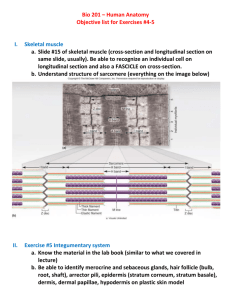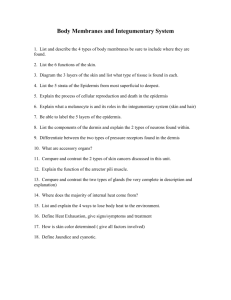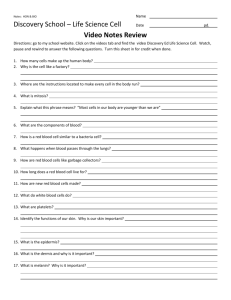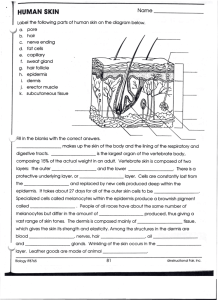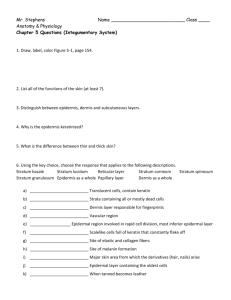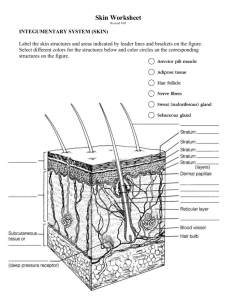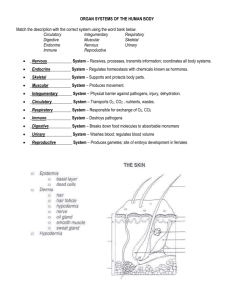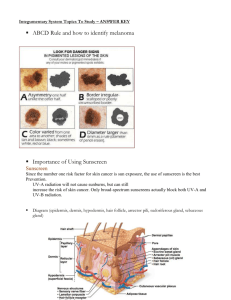Epidermis Dermis
advertisement
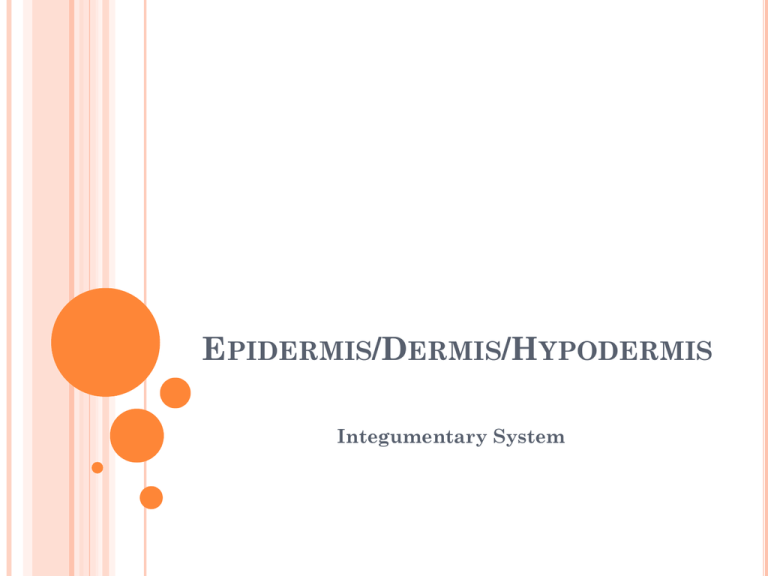
EPIDERMIS/DERMIS/HYPODERMIS Integumentary System THE EPIDERMIS Epidermis: composed of 5 zones or layers called _STRATA_. From the inside out these are called: Stratum _BASALE_, _SPINOSUM_, _GRANULOSUM_, __LUCIDUM_, and _CORNEUM_. “Basic Skin Gets Lots of Care” THE EPIDERMIS Like all epithelial tissues the epidermis is _AVASCULAR_. Most of the cells are _KERATINOCYTES_ (keratin cells) which produce _KERATIN_ that makes the epidermis a tough protective layer. THE EPIDERMIS The deepest layer is called the stratum _BASALE_. These cells are constantly undergoing cell _DIVISION_. Millions of new cells are produced daily. These cells push up away from the dermis and up to the more _SUPERFICIAL_ layers of the epidermis. THE EPIDERMIS The next layer is the stratum _SPINOSUM_ and then the stratum _GRANULOSUM_. Then the cells become _FLATTER_, increasingly full of _KERATIN_ and finally _DIE_. This then forms the next layer, the stratum _LUCIDUM_, which is clear and found only where the skin is _HAIRLESS_ and extra thick. (Palms of hands and soles of feet). THE EPIDERMIS The outermost layer, the stratum _CORNEUM_ is _20_ to _30_ cell layers thick and accounts for about three-quarters of the epidermal thickness. This layer is filled with _KERATIN_ to provide us with an “overcoat” for the body. This layer rubs and flakes off slowly and steadily. It is replaced with the basale cells so we have a totally new epidermis every _25_ to _45_ days. THE DERMIS The dermis is your “hide.” It is a strong, stretchy envelope that is composed of _DENSE_ _CONNECTIVE_ tissue. The dermis consists of 2 major regions: (1) _PAPILLARY_ layer and (2) the _RETICULAR_ layer. THE DERMIS The _PAPILLARY_ layer is the upper layer. It has uneven _FINGERLIKE_ projections from its superior surface called dermal _PAPILLAE_ which indents the epidermis above. Many of these contain _CAPILLARY_ loops which furnish _NUTRIENTS_ to the epidermis. THE DERMIS Others house _PAIN_ receptors and touch receptors called _MEISSNER’S_ _CORPUSLCES_. The ridges that are formed complete the _FINGERPRINTS_ that are used to identify us. THE DERMIS The _RETICULAR_ layer is the _DEEPEST_ skin layer. This area contains the following: _BLOOD_ _VESSELS_, _SWEAT_ and _OIL_ _GLANDS_, and deep pressure receptors called _PACINIAN_ _CORPUSCLES_. Here are many _PHAGOCYTES_ that act as another protective barrier if bacteria gets through. THE DERMIS Both _COLLAGEN_ and _ELASTIC_ fibers are found to allow for the toughness of the dermis. The dermis is abundantly supplied with _BLOOD_ vessels that are vital in body temperature _HOMEOSTASIS_. The dermis also has a rich _NERVE_ supply. These nerve endings have specialized receptor-end organs that send messages to the CNS for interpretation. Examples include: _PRESSURE_ and _TEMPERATURE_.
